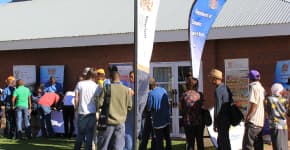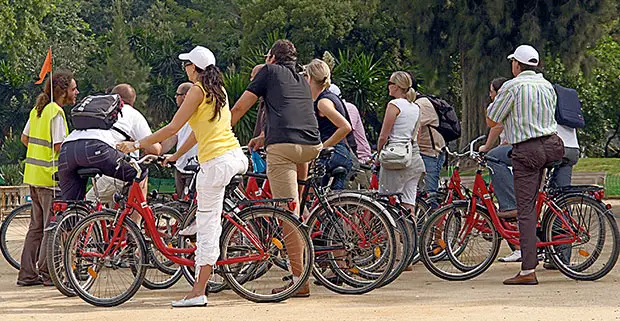A Brief History on Tourist Guiding in South Africa
Guiding in South Africa was a pretty haphazard affair until Don Briscoe filmed a “candid camera” video of a guide giving commentary on a tour, which was aired in the early days of TV – about 1970. By Anne Lawrance.
Alarmed at what was shown on the video, a number of professional guides got together and formed an association – The South African Council of Tour Guides. The main aim was to improve the image and professionalism of guides.
In the late 1970’s we started pushing for registration for guides, to ensure that people giving commentary to overseas visitors were well informed and unbiased. We also set down guidelines for training which included a trainee guide accompanying a qualified guide on a minimum of three tours to learn the practical aspects of guiding.
The name of the national council was changed to the South African Association of Tour Guides and there were active branches in the Transvaal, Natal, Garden Route and Cape Town. I was nominated as the editor of our monthly newsletter “Guidelines”, and sometime later I was elected National Chairman. We had regular provincial meetings and kept in touch with all the branches telephonically. We even managed to have national AGMs which were well attended by representatives from the different branches. One of our main objectives was to improve the standard of guiding and also to establish a relationship with the young Southern Africa Tourism Services Association (SATSA). I was asked to represent guides on the ExCo of SATSA, a position I held for a number of years.
In 1985 I was one of four guides to attend the founding meeting of the World Federation of Tourist Guides in Israel, the others being Luan Grant, Noel Celliers and Tony Molineux. We participated in lengthy discussions, and I helped to draw up the first constitution of the World Federation of Tourist Guide Associations (WFTGA).
It was after this that we changed the name of our association to the South African Association of Registered Tourist Guides. It’s interesting to note that we were one of the only countries to have legislation in place regarding the registration of tourist guides. We agreed to abide by the international code of conduct as drawn up by WFTGA.
I served on the Executive Committee of WFTGA twice, each term of office being for two years. South Africa put in no less than three bids to hold the WFTGA convention and finally we hosted the convention in Pretoria in 1993 – a great milestone for our SA Association of Registerd Tourist Guides.
Since then there have been further changes. I was part of the discussions which led to the more structured training of tourist guides although I did not participate in setting down the actual standards by SAQA.
In my opinion guiding in South Africa has come a long way since these early days. Although I trained guides for many years I stopped training when the new regulations came in as there was so much paper work required and, in my opinion, not enough attention to the actual practical aspect of guiding. Unfortunately it is possible for someone to become a regional or even national guide in a very short space of time and often without ever having actualy visited the places!
We have far too many people guiding in English, not their mother tongue, giving information to people for whom English is also not their mother tongue and the message is often not clear at all. We also have foreign nationals who have somehow managed to become registered guides because they speak a foreign language but actually have vey little real knowledge of our country.
So what is a tourist guide? It is someone who accompanies visitors and interprets the environment in an entertaining and enlightened way in order to enrich the experience. We are not tour guides, or couriers or tour leaders or tour managers. We are tourist guides – we guide the tourists.
With the rapid advent of changing technology, tourist guides also need to re-invent themselves. Already it is possible to get a great deal of information on a smartphone. There is also Tourist Radio which gives information – and that is information which is relevant to your position as determined by satellite! So if guides are doing no more than giving information how can we justify the additional expense to the tourist?
A professional guide has to be so much more. A professional guide also has to be an entertainer in the sense of keeping commentary interesting and relevant – the tourist needs to feel that the experience is enriched by the tourist guide.
Regarding the proposed fine for non-registered guides, I feel this becomes protectionist. It could result in “registered” guides not doing their very best but expecting to be paid just because they are registered.
Recently I was on an open vehicle game drive in the Kruger Park run by one of the long-established operators in Hazyview and our “guide” spoke to the guests as though they were in kindergarten, drove at great speed (over the limit) from one sighting to the next. There was no additional information about the animals; there was no interpretation and to make matters worse he spent a great deal of time singing in a high pitched monotonous voice while beating time on the side of the vehicle! Later we were subjected to idle chatter between him and his colleague at full volume on the radio.
There are many tour operators who would rather use a guide who has the knowledge, experience and professionalism even though that person may not have renewed their registration. I think it’s quite wrong to make this a criminal offence. And by having the option to impose very big fines I think tour operators, especially those in very competitive markets where margins are slim, might be forced to do without guides accompanying tourists on overland trips and use step-on guides at the different stops.
About the Author: Anne Lawrance is a National Tourist Guide based in Pretoria and guides tours throughout South Africa. She has a Professional Driver’s Permit and her licence allows for a Sprinter size vehicle (± 17 seats). Anne’s mother tongue is English and she also speaks French, Afrikaans and Italian.



